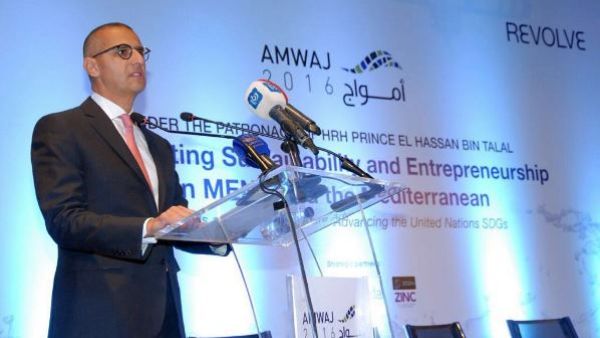PepsiCo concludes first edition of AMWAJ Sustainability and Entrepreneurship Forum

Following two days of inspirational speakers, valuable networking opportunities and spirited discussions, PepsiCo – the global food and beverage company – has concluded the first edition of the AMWAJ Forum, an international sustainability and entrepreneurship forum. Organized by PepsiCo and Revolve Media, in cooperation with entrepreneurship-building organizations, Ahead of the Curve and Wamda, the Forum was held on 27 and 28 November, 2016, at the Amman Rotana Hotel.
The AMWAJ Forum was devised by PepsiCo as a continuation of its sustainability and entrepreneurship efforts across the world, carried out under its goal to deliver ‘Performance with Purpose’ in all facets of its operations. The two-day event aimed to foster a dialogue between local, regional and international stakeholders, encouraging cooperation to advance the United Nations Sustainable Development Goals (UN SDGs) and to achieve a sustainable future in the Middle East and North Africa (MENA).
Taking part in the Forum was Ahmad Al Hindawi, a Jordanian national serving as the United Nations Secretary-General’s Envoy on Youth. In a rousing speech, Al Hindawi acknowledged the many challenges facing youth, but insisted that success is not an exception in the region, as evidenced by the triumphs of the many entrepreneurs in attendance. Other notable AMWAJ Forum speakers included Ambassador Andrea Matteo Fontana, Head of the EU Delegation to Jordan; Dr. Tarek Youssef, Director of the Brookings Doha Center; Ahmed El Sheikh, Senior Vice President and General Manager, Egypt and Jordan at PepsiCo; Noha Hefny, Director of Corporate Affairs at PepsiCo MENA; Stuart Reigeluth, Founder of Revolve Water; Dina Sherif, CEO of Ahead of the Curve; and Ruba Al-Zu’bi, CEO of Energy, Water & Environment (EDAMA), among many others.
Over the course of two days, the AMWAJ Forum featured numerous activities, media workshops, debates and field trips to water projects in Jordan, conducted under two streams: Sustainability and Entrepreneurship. With a focus on activating the role of the media in driving sustainable development challenges in the MENA, the forum addressed the many complexities of covering water-related stories, advising journalists to research such pieces thoroughly, place issues in their historical contexts and encourage good citizenship through responsible coverage. The Forum also included a presentation by PepsiCo-Jordan General Manager, Eng. Nidal Hamam, on the Company’s many water projects in the Kingdom, revealing that the company now contributes more water to the Kingdom’s reserves than it consumes.
Throughout the Forum, attendees were encouraged to contribute to a commitment wall, upon which they wrote their thoughts and reflections regarding the path forward in achieving the UN SDGs. Stakeholders from a wide-range of backgrounds used the board to pledge their commitment to issues they felt passionately about, such as securing low-cost education; recognizing the interconnectivity of the water cycle; achieving workplace inclusion; and driving girls’ education, to name a few.
The Forum concluded with an official awards ceremony revealing Napata as the first-place winner of the PepsiCo Social Impact Competition. Based in Egypt, the project recycles palm waste into handmade, eco-friendly traditional products that capture the Nubian identity and culture. Green Alafco, a Tunisian startup that recycles aluminum, took second place, while the Lebanese startup, Pathfinder, which offers automated visual aid and a navigation system to serve the visually impaired, won third place. The top three winners shared a USD 20,000 prize. Launched in partnership with Wamda, the PepsiCo Social Impact Competition aims to support, reward and encourage social enterprise startups from the Arab World that seek to achieve sustainable profit, as well as those that develop innovative solutions that extend beyond profitability to also include social responsibility and environmental impact.
“As more people have begun aligning themselves with the values of sustainability, youth are striving to not only work at companies that are purpose-driven, but also to start their own environmentally- and socially-conscious companies. This will not be attainable without ensuring that more companies are investing in young people and departing from the classic idea of social responsibility as a means to simply feel good,” said Ahmad Al Hindawi of the UN. “I commend PepsiCo for this initiative, which combines development with sustainability, and I invite more companies to follow their lead and join the march toward sustainability by investing in the region’s youth.”
Background Information
Pepsi Cola International
In 1965, Donald Kendall, the CEO of Pepsi-Cola, and Herman Lay, the CEO of Frito-Lay, recognized what they called “a marriage made in heaven,” a single company delivering perfectly-salty snacks served alongside the best cola on earth. Their vision led to what quickly became one of the world's leading food and beverage companies: PepsiCo.
For more than 50 years, as tastes, trends and lifestyles have changed, PepsiCo has evolved with them. Our willingness to adapt and grow has transformed our snack and soda company into a collection of global brands including Pepsi and Quaker, Gatorade and Tropicana, Frito-Lay and beyond. Today, PepsiCo is one of the world’s most-respected companies with products sold in more than 200 countries and territories and 22 brands that generate more than $1 billion each in estimated annual retail sales.






